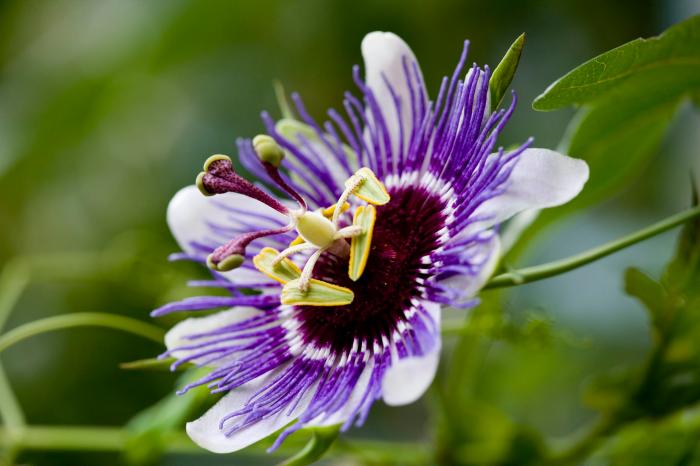Passion flowers, known scientifically as Passiflora, are striking and unique blooms. They are not only admired for their beauty but also carry rich symbolism across various cultures. This article explores the meaning and significance of passion flowers, highlighting their cultural associations and uses.
Overview of Passion Flowers
Passion flowers are easily recognizable due to their intricate structure. They typically feature a central corona of colorful filaments surrounded by petals and sepals. The flowers can come in various colors, including purple, white, blue, and red. Passion flowers are often found in tropical and subtropical regions, thriving in gardens and wild landscapes.
Historical Background
The history of passion flowers is both fascinating and varied. They were first discovered by Spanish explorers in South America. The unique shape of the flower led them to associate it with the Passion of Christ. This connection significantly influenced the flower’s symbolism in Christianity.
In indigenous cultures, passion flowers were used for their medicinal properties. They were believed to have calming effects and were used to treat anxiety and insomnia. This dual role in both healing and spiritual symbolism enhances the flower’s significance.
Religious Symbolism
Passion flowers hold deep religious symbolism, particularly in Christianity. The name “passion” refers to the Passion of Jesus Christ, encompassing his suffering and crucifixion.
The Elements of the Flower
Each part of the passion flower symbolizes an aspect of the Passion:
The Ten Petals and Sepals: These represent the twelve apostles, with the missing two symbolizing Judas Iscariot and Peter, who denied Christ.
The Five Anthers: These symbolize the five wounds of Christ.
The Tendrils: These represent the whips used in Christ’s scourging.
This intricate symbolism makes passion flowers a powerful representation of faith and redemption.
Use in Religious Art
In Christian art, passion flowers often appear as symbols of faith and resurrection. They serve as reminders of sacrifice and hope. This symbolism is prevalent in various artworks, liturgical decorations, and even in church gardens.
Cultural Significance
Beyond religious symbolism, passion flowers carry cultural meaning in various societies. In many South American cultures, they are associated with love and fertility.
Love and Romance
The delicate and exotic appearance of passion flowers makes them popular in romantic settings. In some cultures, they are given as gifts to express love and passion. Their vibrant colors and unique structure evoke feelings of desire and attraction.
Fertility and Growth
In addition to love, passion flowers symbolize fertility. The abundance of blossoms signifies growth and new beginnings. This connection is especially meaningful in agricultural societies, where the flower is a sign of bountiful harvests.
Medicinal Uses
Historically, passion flowers have been used in traditional medicine. They are known for their calming effects and are often used to treat anxiety, insomnia, and restlessness.
Herbal Remedies
Passion flower extracts are available in teas, tinctures, and supplements. These remedies are popular for promoting relaxation and improving sleep quality. The calming properties of the flower contribute to its enduring popularity in herbal medicine.
Modern Research
Recent studies have confirmed some of the traditional uses of passion flower. Research shows that it can be effective in reducing anxiety and promoting a sense of calm. This scientific validation of its medicinal properties further enhances the flower’s reputation.
Passion Flowers in Art and Literature
Passion flowers have inspired countless artists and writers throughout history. Their unique appearance and symbolism make them popular subjects in various forms of creative expression.
Visual Arts
In painting, passion flowers are often depicted to convey themes of love, spirituality, and nature. Artists appreciate their intricate design and vibrant colors, making them a captivating subject.
Literature
In literature, passion flowers are used as metaphors for love, beauty, and the complexities of life. Their rich symbolism provides depth to poetic and narrative works, allowing authors to explore profound themes.
Gardening and Cultivation
Growing passion flowers can be a rewarding experience. These plants are relatively easy to cultivate, making them popular among gardeners.
Choosing the Right Variety
There are numerous species of passion flowers, each with unique characteristics. When selecting a variety, consider your climate and the desired aesthetic. Some popular varieties include Passiflora caerulea (blue passion flower) and Passiflora edulis (purple passion fruit).
Growing Conditions
Passion flowers thrive in well-drained soil and require full sunlight. They can be grown in pots or directly in the ground. Regular watering is essential, especially during dry spells. Providing support for climbing varieties is crucial, as they are vigorous growers.
Pruning and Maintenance
Pruning helps maintain the shape and health of passion flower plants. It encourages new growth and flowering. Remove any dead or damaged stems to promote airflow and prevent diseases.
Passion Flowers in Arrangements
Passion flowers are a popular choice in floral arrangements. Their unique shape and vibrant colors make them stand out.
Wedding Bouquets
In wedding bouquets, passion flowers symbolize love and fidelity. Their exotic appearance adds elegance and sophistication to bridal arrangements. They pair well with other flowers, creating stunning combinations.
Decorative Displays
Passion flowers can be used in various decorative displays. Their striking colors make them ideal for centerpieces and event decor. Whether used fresh or dried, they add a unique touch to any arrangement.
See also: What is the Meaning of Cactus Flower
Conclusion
The symbolism of passion flowers is rich and diverse. They represent love, spirituality, and healing across cultures. From their historical significance in Christianity to their use in herbal medicine, passion flowers continue to captivate and inspire.
Whether admired in gardens, used in floral arrangements, or cherished for their medicinal properties, passion flowers hold a special place in the hearts of many. Embrace their beauty and symbolism, and let passion flowers enhance your life with their vibrant presence.


